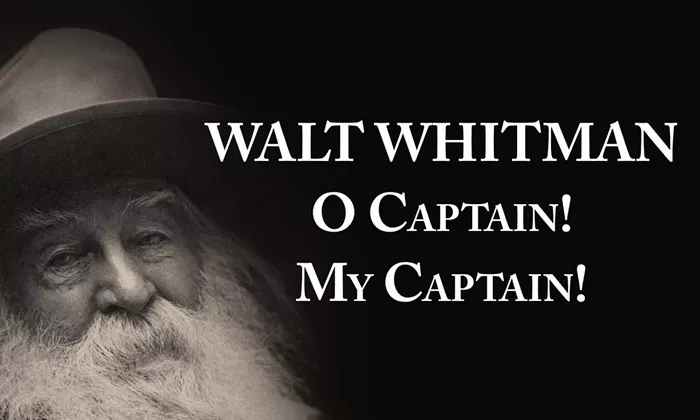Welcome to Poem of the Day – O Captain! My Captain! by Walt Whitman.
“O Captain! My Captain!” is one of the most famous poems written by Walt Whitman, an iconic American poet. Published in 1865, this poem was a tribute to President Abraham Lincoln following his assassination. Through the poem, Whitman expresses his deep sorrow over the loss of Lincoln, who had guided the nation through its most tumultuous times. This article aims to explain the meaning and significance of the poem, offering a closer look at its themes and structure.
O Captain! My Captain! Explanation
The Context of the Poem
At the time Walt Whitman wrote this poem, the United States had just emerged from the Civil War, and President Abraham Lincoln was assassinated in April 1865. Lincoln’s leadership had been pivotal in preserving the Union during the war. His death left a profound impact on Whitman, who was a strong admirer of the president. “O Captain! My Captain!” reflects Whitman’s grief and reverence for Lincoln, encapsulating both the joy of victory and the sorrow of loss.
Structure of the Poem
The poem is composed of three stanzas. The structure is simple, yet effective. Whitman uses a regular meter and rhyme scheme, which gives the poem a musical quality. This formal structure contrasts with the intense emotion conveyed in the poem, amplifying the reader’s sense of loss and mourning.
First Stanza
The first stanza sets the scene by describing the captain’s death. The captain, a metaphor for President Lincoln, is referred to as the one who “has weathered every rack”—a reference to the hardships of the Civil War. The poem’s speaker expresses that the “ship” (representing the nation) has reached its destination, but the captain lies dead. This juxtaposition of victory and death is central to the emotional impact of the poem.
In this stanza, Whitman uses imagery to show the deep connection between the nation and its leader. The “flag” that “flutters” and the “bells” that ring for victory symbolize the joy of triumph, but the sadness of the captain’s death looms over these celebrations.
Second Stanza
In the second stanza, Whitman emphasizes the sorrow of the nation. The speaker calls out to the captain, asking him to “rise up” and join in the celebration of the ship’s safe arrival. However, the captain remains lifeless, symbolizing Lincoln’s untimely death. The phrase “fallen cold and dead” reflects the suddenness of Lincoln’s assassination, which occurred just as the nation was celebrating the end of the Civil War.
Here, Whitman contrasts the joy of victory with the grief of losing a beloved leader, highlighting the emotional turmoil of the moment.
Third Stanza
The third stanza focuses on the speaker’s personal grief. The speaker, deeply moved by the loss of the captain, continues to mourn, but there is a sense of acceptance. The speaker recognizes that while the captain is dead, his leadership and the victory he brought to the nation will live on.
This stanza shifts the tone slightly from sorrow to remembrance, as the speaker acknowledges the greatness of the captain’s deeds and the lasting impact of his leadership.
Themes of the Poem
Grief and Loss
The central theme of “O Captain! My Captain!” is the grief that follows the death of a great leader. Whitman captures the paradox of mourning someone who has achieved a monumental victory. The poem shows that while the nation has won the war, the cost is the life of its beloved leader. Whitman’s grief is not just personal but also national, as he mourns the loss of Lincoln, who symbolized hope and unity for the country.
Heroism and Sacrifice
The captain in the poem represents not just Lincoln, but all leaders who sacrifice their lives for the greater good of their nation. Whitman emphasizes the captain’s strength in leading the ship through a storm—an allegory for the challenges faced during the Civil War. The poem also underscores the idea that true heroes may not live to see the fruits of their labor, as the captain dies just as the ship reaches safety.
The Irony of Victory and Death
The poem explores the deep irony that the nation has emerged victorious, but at the cost of its leader’s life. Whitman juxtaposes the celebration of the ship’s safe arrival with the tragic death of its captain. This contrast underscores the emotional complexity of the moment: joy mixed with profound sorrow.
Tone and Imagery
The tone of “O Captain! My Captain!” is one of sorrow and reverence. Whitman’s use of vivid imagery—such as the “trumpets” and the “mournful bugle”—creates a powerful emotional atmosphere. The imagery of the “blood-red sky” and the “vessel grim and daring” invokes both the beauty of the nation’s triumph and the pain of its loss.
Conclusion
“O Captain! My Captain!” by Walt Whitman is a powerful and emotional tribute to Abraham Lincoln. Through its simple yet effective structure, the poem captures the paradox of victory and loss, celebrating the president’s leadership while mourning his untimely death. Whitman’s use of imagery and tone allows the reader to feel the depth of his grief and reverence for Lincoln. The poem remains a timeless expression of national mourning and remembrance, resonating with readers long after its publication.

